Veranstaltungen und Aktivitäten
Open access publication studies communicative places in rural Germany and Japan
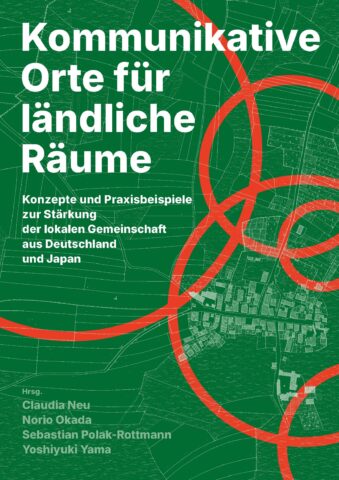 This open access volume (in German; English and Japanese translations forthcoming) contains four short research articles presenting approaches to communicative places in Germany and Japan, as well as seven essays by researchers involved in the projects, local actors, or visitors to these places. The publication facilitates both a conceptual discussion of communicative places and a deeper understanding of practical social projects in both countries. The authors understand the concept of communicative places as an umbrella term for the spatial aspects of (re)vitalisation practices in rural communities – that alternatively are also referred to as ‘social places’ or ‚places of resilience‘. The volume’s theoretical texts complement the case studies and excursion reports. The publication is co-edited by Claudia Neu, Norio Okada, Yoshiyuki Yama, and DIJ’s Sebastian Polak-Rottmann who also contributed a short research article on places of resilience in rural Japan.
This open access volume (in German; English and Japanese translations forthcoming) contains four short research articles presenting approaches to communicative places in Germany and Japan, as well as seven essays by researchers involved in the projects, local actors, or visitors to these places. The publication facilitates both a conceptual discussion of communicative places and a deeper understanding of practical social projects in both countries. The authors understand the concept of communicative places as an umbrella term for the spatial aspects of (re)vitalisation practices in rural communities – that alternatively are also referred to as ‘social places’ or ‚places of resilience‘. The volume’s theoretical texts complement the case studies and excursion reports. The publication is co-edited by Claudia Neu, Norio Okada, Yoshiyuki Yama, and DIJ’s Sebastian Polak-Rottmann who also contributed a short research article on places of resilience in rural Japan.
Neue DIJ-Monographie untersucht Kulturelles Übersetzen in der japanischen Literatur
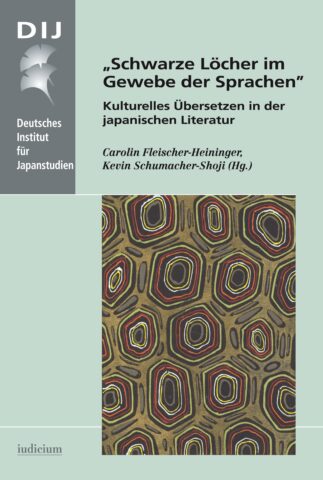
Übersetzungen sind niemals nur Übersetzungen von Wörtern, sondern umfassen auch kulturelle Bezugshorizonte. Als Beitrag zur Bildung, Abgrenzung und Konsolidierung kultureller und sozialer Identitäten bietet das Kulturelle Übersetzen verschiedene thematische, theoretische und methodische Ansätze für die literatur- und textimmanente Forschung und regt zur Reflexion über disziplinäre Grenzen an. Der Sammelband „Schwarze Löcher im Gewebe der Sprachen“: Kulturelles Übersetzen in der japanischen Literatur, herausgegeben von DIJ-Literaturwissenschaftlerin Carolin Fleischer-Heininger und Kevin Schumacher-Shoji, untersucht das Kulturelle Übersetzen anhand von neun Fallstudien, darunter auch zu Japans Verlagspluralismus und Praktiken der Retranslation von DIJ-Forscherin Nicole M. Mueller. Das Buch ist erschienen bei Iudicium als Band 68 der DIJ-Monographienreihe.
Meat, Expo, and Resilience: New articles on ‚Sustainability in Japan and Beyond‘ blog
 What does sustainability mean in Japan and how can it be researched? The multidisciplinary blog ‘Sustainability in Japan and beyond’ highlights current research on sustainability in Japanese society. The blog posts are based on projects by members of the DIJ research cluster ‘Sustainability in Japan’ and contain reflections and reports from ongoing research. Sebastian Polak-Rottmann, head of the research cluster and editor of the blog, also invites contributions from external researchers dealing with sustainability in Japan or other countries and regions. The first five blog posts include reports on research excursions to post-disaster areas in Ishikawa, rural parts of Tokyo, and to the Expo in Osaka; a report of a conference on sustainability; and an article on meat consumption.
What does sustainability mean in Japan and how can it be researched? The multidisciplinary blog ‘Sustainability in Japan and beyond’ highlights current research on sustainability in Japanese society. The blog posts are based on projects by members of the DIJ research cluster ‘Sustainability in Japan’ and contain reflections and reports from ongoing research. Sebastian Polak-Rottmann, head of the research cluster and editor of the blog, also invites contributions from external researchers dealing with sustainability in Japan or other countries and regions. The first five blog posts include reports on research excursions to post-disaster areas in Ishikawa, rural parts of Tokyo, and to the Expo in Osaka; a report of a conference on sustainability; and an article on meat consumption.
Open access article explains well-being experience of making others happy
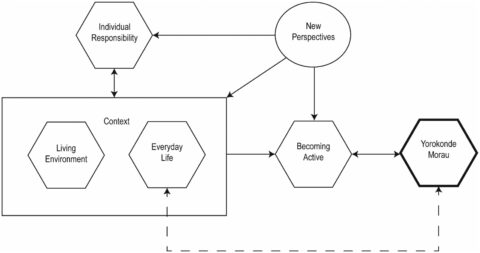 A new journal article by DIJ anthropologist Sebastian Polak-Rottmann and DIJ alumnus Dionyssios Askitis (Vienna University) introduces yorokonde morau (making others happy) as a novel concept of well-being originating from lay discourse on happiness in Japan. Their article „Yorokonde Morau: the shared well-being experience of making others happy (and feeling happy because of it)“ was published open access in the summer issue of the Social Science Japan Journal. The study explains yorokonde morau as an interactive and reciprocal understanding of well-being. The concept is the outcome of a mixed-methods research project focusing on the ‘positive feedback loop’ of reciprocal well-being observed in high-trust communities. Combining qualitative and quantitative findings, the authors found that the reciprocal experience of yorokonde morau is characterized less by negative social capital and more strongly linked to generalized trust in others than interdependent happiness. Grounded in the real-life experiences of everyday Japanese people, this approach represents a new reciprocal facet of sociocentric well-being.
A new journal article by DIJ anthropologist Sebastian Polak-Rottmann and DIJ alumnus Dionyssios Askitis (Vienna University) introduces yorokonde morau (making others happy) as a novel concept of well-being originating from lay discourse on happiness in Japan. Their article „Yorokonde Morau: the shared well-being experience of making others happy (and feeling happy because of it)“ was published open access in the summer issue of the Social Science Japan Journal. The study explains yorokonde morau as an interactive and reciprocal understanding of well-being. The concept is the outcome of a mixed-methods research project focusing on the ‘positive feedback loop’ of reciprocal well-being observed in high-trust communities. Combining qualitative and quantitative findings, the authors found that the reciprocal experience of yorokonde morau is characterized less by negative social capital and more strongly linked to generalized trust in others than interdependent happiness. Grounded in the real-life experiences of everyday Japanese people, this approach represents a new reciprocal facet of sociocentric well-being.
Open access article on digitalization, institutional failure and new instability in Japan
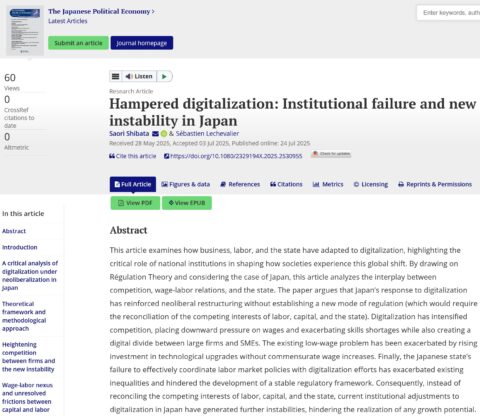 Digitalization is not only a technological matter. Institutional change is required to increase its benefits and mitigate its destructive effects. These are key findings of a new research article by DIJ economist Sébastien Lechevalier and Saori Shibata (University of Sheffield). Their open access article „Hampered digitalization: Institutional failure and new instability in Japan“ (The Japanese Political Economy, online first) examines how business, labor, and the state have adapted to digitalization, highlighting the critical role of national institutions in shaping how societies experience this global shift. Drawing on regulation theory and considering the case of Japan, the article analyzes the interplay between competition, wage-labor relations, and the state. It argues that Japan’s response to digitalization has reinforced neoliberal restructuring without establishing a new mode of regulation. Consequently, instead of reconciling the competing interests of labor, capital, and the state, current institutional adjustments to digitalization in Japan have generated further instabilities, hindering the realization of any growth potential.
Digitalization is not only a technological matter. Institutional change is required to increase its benefits and mitigate its destructive effects. These are key findings of a new research article by DIJ economist Sébastien Lechevalier and Saori Shibata (University of Sheffield). Their open access article „Hampered digitalization: Institutional failure and new instability in Japan“ (The Japanese Political Economy, online first) examines how business, labor, and the state have adapted to digitalization, highlighting the critical role of national institutions in shaping how societies experience this global shift. Drawing on regulation theory and considering the case of Japan, the article analyzes the interplay between competition, wage-labor relations, and the state. It argues that Japan’s response to digitalization has reinforced neoliberal restructuring without establishing a new mode of regulation. Consequently, instead of reconciling the competing interests of labor, capital, and the state, current institutional adjustments to digitalization in Japan have generated further instabilities, hindering the realization of any growth potential.
DIJ Newsletter Summer 2025

The summer issue of our DIJ Newsletter features updates on our research, publications, and events as well as news from the Institute, our team, and our outreach activities. We hope you will enjoy exploring this new edition of the DIJ Newsletter. If you haven’t done so yet, you can subscribe to receive our Newsletters directly to your inbox. The full issues and subscription form are available here.
New book by Carolin Fleischer-Heininger studies Terayama Shūji and his influence on Japan’s post-war society
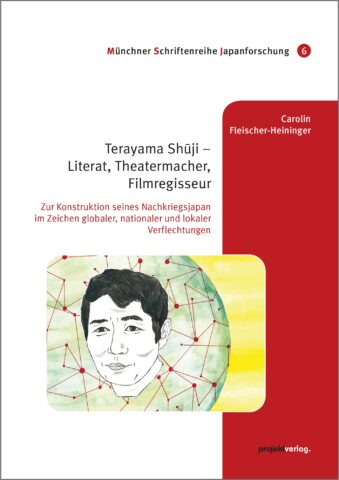
What can literary and artistic works reveal about their time – and how do they shape it? In her new book Terayama Shūji – Literat, Theatermacher, Filmregisseur. Zur Konstruktion seines Nachkriegsjapan im Zeichen globaler, nationaler und lokaler Verflechtungen, DIJ researcher Carolin Fleischer-Heininger explores the construction of postwar Japan through literary, dramatic, and cinematic works of Terayama Shūji (1935–1983). Her study considers the different spatial frames of reference – Aomori, Japan and the world – that guided Terayama’s views and analyses his works with regard to formal and stylistic characteristics. As she shows, Terayama shaped Japan’s cultural landscape by mirroring Japanese society and its narratives. Consequently, Terayama became one of Japan’s most influential and controversial cultural figures. Drawing on theories of globalization and cultural history, Fleischer-Heininger also examines how Terayama’s works negotiate narratives of national identity and historiography in postwar Japan.
Open access article by Sébastien Lechevalier introduces French–Japanese research project on innovation led by care

As societies age, eldercare faces mounting challenges that technology alone cannot solve. The article „Care-led innovation: the case of eldercare in France and in Japan“, co-authored by DIJ researcher Sébastien Lechevalier, Yuko Tamaki Welply, Christophe Humbert, Katsunori Shimohara, and Jean-Marie Robine, introduces the French–Japanese research project INNOVCARE, whose aim is to develop fundamental research on the heterogeneous and evolving needs of older adults and to incorporate it into the conception and development of these technologies, with the aim of promoting a form of innovation led by care. Comparing France and Japan and emphasizing dignity, relational autonomy, and quality of life, the study highlights how an ethics of care approach can bridge the gap between social needs and technological innovation, aiming to empower both those receiving care and their caregivers. The article is published open access in the International Journal of Care and Caring (April 2025, early view).





 Open Access
Open Access 
